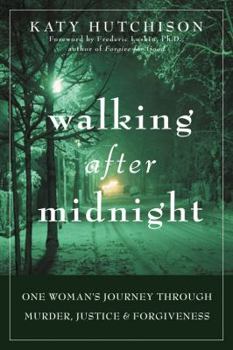Walking After Midnight: One Woman's Journey Through Murder, Justice & Forgiveness
Many people who have been harmed or wronged often feel that to respond with non-violence and forgiveness is to be weak. As Katy Hutchison reveals here, to forgive and seek reconciliation not only... This description may be from another edition of this product.
Format:Hardcover
Language:English
ISBN:1572245034
ISBN13:9781572245037
Release Date:October 2006
Publisher:New Harbinger Publications
Length:266 Pages
Weight:1.48 lbs.
Dimensions:0.9" x 6.4" x 9.3"
Customer Reviews
3 ratings
A popular pick for any public lending library.
Published by Thriftbooks.com User , 17 years ago
On New Year's Eve in 1997 a father left his dinner table to check on a disturbance at a neighbor's house - and never came back. He was killed by an unknown assailant and left behind his wife - author Katy Hutchison - and twin four-year-olds. Katy moved to a different town, made a life for herself, remarried - but always lived with questions about her husband's murder, until in 2002 police arrested a suspect. Her decision to meet with the man who had killed her husband led to new revelations and makes WALKING AFTER MIDNIGHT a powerful autobiography of true crime and redemption that will be a popular pick for any public lending library. Diane C. Donovan California Bookwatch
Walking after Midnight
Published by Thriftbooks.com User , 17 years ago
Katy shares her poignant story about the murder of her husband and the reconciliation with Ryan, the young adult responsible for her husbands' death. Together, Katy and Ryan now speak to international audiences about the positive affect reconciliation and forgiveness has on their lives and those around them; and the dangers of alcohol and drug abuse. Katy's work introduces and supports victim/perpetrator reconciliation programs in prisons. The book underscores one of the most important messages to humans today: that the power found in forgiveness and reconciliation removes emotional turmoil and the pain of hurt from our lives and is a guiding path to personal growth. Katy also shows us how responsible ownership for behavior releases us from self-guilt, giving freedom to embrace every day. Without a doubt, the book illuminates how forgiveness from within can and does have the power to change our attitude and impact those around us.
A Powerful Story but the Writing Could be Better
Published by Thriftbooks.com User , 18 years ago
In a world where an "eye for an eye," and a "tooth for a tooth" is often the law of the land, it is a welcomed relief to read a book about forgiveness and reconciliation, especially after a horrendous act of murder. A young man who was drunk at the time brutally and senselessly murdered Katy Hutchinson's first husband, Bob, on New Year's Eve in 1997. No one could have faulted the author had she called for the full force of the law to come down on the killer and send him away to prison for life. Instead, she reaches out to him and through numerous personal contacts seeks to understand what led him to kill her husband, helps him to come to grips with his past, make amends, and begin his life anew in a productive manner. Her basic philosophy is that it is senseless to destroy another life over this incident; there has already been enough hurt on the part of her husband, her, and her children. Mrs. Hutchinson shows that forgiveness while not easy is possible after tragic and painful events, and that it is possible for a young man who killed to begin reconstructing his life in a positive way. It is worth the time to read the book to realize that the way to end violence is not with more violence, but with redemptive love. My criticisms of the book lie not with Mrs. Hutchinson's experience or motivations but with the way in which it was written. The great Russian writer, Franz Kafka, said that if you are going to put a gun on the mantle piece in the beginning of your story, someone has got to use the gun before the end of the story. He was referring to the fact that you don't introduce ideas or characters and then not deal with them. "Walking After Midnight" introduces many situations that never are fully dealt with or resolved. As a reader who does not know the author, I am left wondering why she said some of the things she did. For example, shortly after her husband's murder she moves from Squamish, British Columbia to Vancouver Island with her children. Her first husband's law partner recommends an attorney, Michael Hutchison, in Vancouver to handle her legal matters. In the course of their meetings, they fall love and are married nine months after her husband is killed. The author indicates that some of her friends and her mother feel uneasy over her relationship with and subsequent marriage to Michael. She says on page 103, "...those who know me well will assuage their fears by reflecting on my history of good decision making. The rest of the world will not see it that way. I don't care..." What she is doing here is bringing to the reader's attention that the people who know her the best are not embracing this relationship. However, she does not show the reader how that reaction is affecting her. Does it make her angry or does it create doubts in her own mind about her impending wedding? How does she resolve this lack of enthusiasm? She says that her friends should trust her knowing her good decision making in the past and for the rest of us, s






